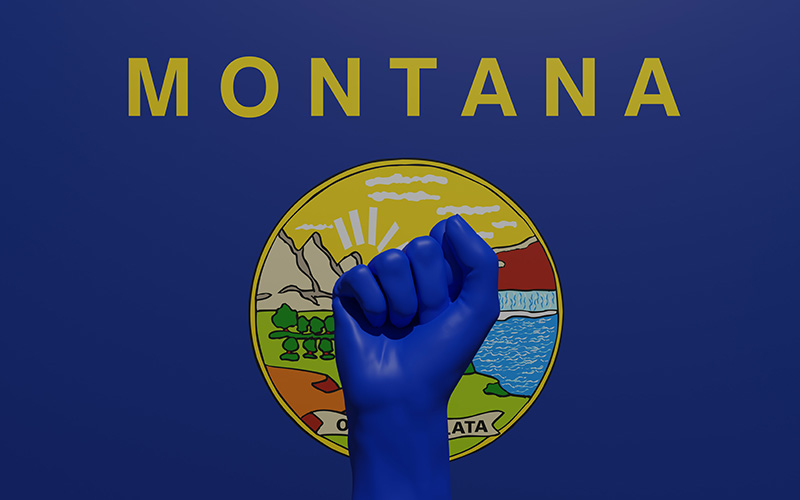When Montana voters replaced incumbent U.S. Sen. Jon Tester (D) with challenger Tim Sheehy (R) in 2024, they deposed the sole remaining Democrat serving in statewide office. Sheehy’s election represented a culmination of a decade-long rightward shift in the state’s politics. As recently as 2013, both the state’s U.S. Senators were Democrats, as was the governor, attorney general, secretary of state, state auditor, and superintendent of public instruction.
Nonetheless, the permanent political infrastructure of the progressive Left—most notably the Montana Federation of Public Employees (MFPE)—continues to work to slow and, if possible, reverse the state’s conservative trend.
As the Freedom Foundation has documented, MFPE—a labor union representing teachers, state employees, and many municipal workers in Montana—seeks to advance its liberal values by playing the long game and indoctrinating public school students and educators in progressive ideology.
But in addition to seeking to reshape society, MFPE invests heavily in electoral politics. In 2023, a Freedom Foundation report analyzed MFPE’s election spending, concluding the union “consistently supports Democrats for office despite attempting to appear bipartisan by occasionally endorsing Republicans.” Two years later, nothing has changed.
In the 2023-24 election cycle, the MFPE spent nearly one million dollars on political contributions and expenditures, according to the Freedom Foundation’s review of the union’s filings with the Montana Commissioner of Political Practices. About 90 percent of its expenditures went to support or oppose candidates for office, while the rest went towards passing school levies and paying administrative expenses.
Of the $870,000 spend by MFPE on candidate elections, 98 percent supported Democratic or Democrat-aligned or endorsed candidates.
Only 1.5 percent of MFPE’s spending on candidate elections backed Republicans. The funds went entirely to back four union-aligned Republicans running for state legislature in the 2024 primary elections, three of whom were MFPE members, against conservative opponents. Only one of the four was elected.

By far the biggest beneficiaries of MFPE’s spending on candidates were the two Democrat-endorsed candidates for Montana Supreme Court—Katherine Bidegeray and Jerry Lynch—and Shannon O’Brien, the Democratic candidate for Superintendent of Public Instruction, who together received $661,320 from MFPE.
While Bidegeray prevailed in her election, Lynch and O’Brien were defeated by their conservative opponents.
Other consistent beneficiaries of MFPE’s largesse were the Montana Democratic Party and the Montana Democratic Legislative Campaign Committee, which cumulatively received 11 contributions from MFPE totaling $43,780.
MFPE sometimes claims to eschew partisanship in favor of “[working] across party lines to deliver for the hardworking Montana families,” using the fact that it sometimes endorses Republican candidates for office as a fig leaf to obscure its far-left partisanship.
Of the 81 candidates MFPE endorsed in the 2024 general election, only 10 were Republicans. Only one of the 10 received any financial support from MFPE—about $3,500 in the primary election. The Republicans endorsed by MFPE last year won their elections by an average of 34 percentage points.
However, in the races in which MFPE backed a Democrat, the average margin of victory was only 10 percentage points.
In other words, MFPE will endorse Republicans running in solidly conservative districts as a way to curry favor. But when it comes to putting its money where its mouth is, the union hopes Republicans don’t look too closely as it dumps hundreds of thousands of dollars into supporting Democrats in competitive elections.
Of course, MFPE is a private organization and can spend its money how it sees fit. The problem is that taxpayers are unwittingly funding MFPE’s partisan political advocacy.
State law currently requires public employers to deduct union dues from the wages of union-represented public employees. While state law prohibits MFPE itself from using members’ dues to contribute to political candidates, MFPE sends a portion of the dues it collects to its two parent affiliates, the National Education Association and American Federation of Teachers, each of which then deposits some of the funds in political committees of their own and contributes hundreds of thousands of dollars back to MFPE for use electing its preferred candidates.
Many government employers—including the GOP-controlled state government—go even further, using their taxpayer-funded payroll systems and personnel to deduct political contributions to MFPE from public employees’ wages in addition to dues.
While policymakers should not single out organizations they don’t like for persecution, neither should they grant special legal privileges to partisan special interests that artificially enhance the power and corrosive influence of leftist unions like MFPE. It’s time for Montana lawmakers to get the government out of the business of collecting union dues and political contributions and let unions stand on their own two feet.
The full list of MFPE’s political expenditures in 2023-24 is available here.










